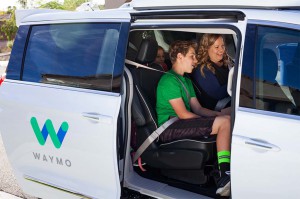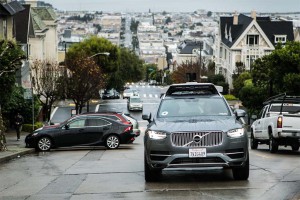
Waymo and Left are partnering up to help the ride-share company accelerate its goals autonomous vehicle goals.
The intensity of the driverless ride-share competition just ratcheted up a bit more with the new partnership between Lyft and Waymo.
Lyft officials believe the deal will accelerate its vision for transportation while Waymo sadi in a statement said a deal to launch self-driving pilots would accelerate its vision for transportation and said the partnership would let its technology reach “more people, in more places.”
Neither offered many details of the agreement. Lyft is the second-largest ride-share service in the U.S. behind Uber, which has been developing its own self-driving vehicles while in the midst of a battle over industrial secrets with Waymo.
The two companies have been locked in a court battle for months over allegations that the former head of Uber’s autonomous program, Anthony Levandowski, downloaded Waymo documents with key information about self-driving technology when he left the company a few years ago and that Uber is applying that information to its own program.
(Judge calls for criminal probe in Waymo/Uber case. For the story, Click Here.)
U.S. District Court Judge William Alsup ruled today that Uber can continue to it’s testing program. However, it must do so without the input or influence of Levandowski, whom the company brought on in 2016 when it bought his company, Otto, which built self-driving semi-trucks.

A judge ruled that Uber can continue its autonomous vehicle program, but without the executive the company hired to run the program.
His ruling specifically barred Levandowski from working on the Uber’s Lidar systems, the laser-based detection system that helps guide self-driving cars on the road. Alsup’s ruling denied Waymo’s request for an overall testing injunction largely because he wasn’t convinced that Waymo’s trade secrets were in jeopardy.
“Not all of Waymo’s 121 asserted trade secrets actually qualify as such, and few have been traced into the accused technology,” Alsup wrote, adding that “Waymo’s patent infringement accusations on this motion also proved meritless.”
However, the ruling also forces Uber officials to accelerate the pace at which they’ve been turning over documents related to the 14,000 pages Levandowski downloaded when he left Waymo.
(Click Here to see more about Uber’s move to Canada.)
“The bottom line is the evidence indicates that Uber hired Levandowski even though it knew or should have known that he possessed over 14,000 confidential Waymo files likely containing Waymo’s intellectual property,” Alsup wrote in his opinion.
He added, “that at least some information from those files, if not the files themselves, has seeped into Uber’s own Lidar development efforts; and that at least some of said information likely qualifies for trade secret protection.”
Both sides put a happy spin on the result. Waymo noted, “The court has also granted Waymo expedited discovery and we will use this to further protect our work and hold Uber fully responsible for its misconduct.”
(Uber refutes Google’s stolen intellectual property charges. Click Here for the story.)
Uber said it was “pleased with the court’s ruling that Uber can continue building and utilizing all of its self-driving technology, including our innovation around Lidar. We look forward to moving toward trial and continuing to demonstrate that our technology has been built independently from the ground up.”
